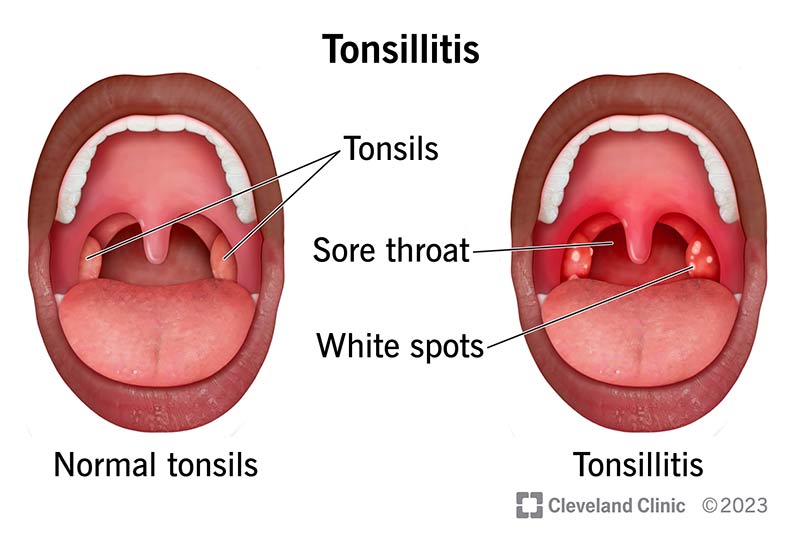Tonsillitis is a common condition characterized by inflammation of the tonsils, which are two
small glands located at the back of the throat. While it can affect individuals of any age,
it is most commonly seen in children and adolescents. Here's a comprehensive overview of
tonsillitis, covering its symptoms, causes, and treatment options:
Symptoms:
- Sore throat: One of the primary symptoms of tonsillitis is a sore throat, which can
range from mild discomfort to severe pain.
- Difficulty swallowing: Due to the swollen tonsils, individuals with tonsillitis may
experience difficulty swallowing, leading to discomfort and pain.
- Fever: Many patients with tonsillitis develop a fever, often accompanied by chills and
sweating.
- Swollen lymph nodes: The lymph nodes in the neck may become swollen and tender in
response to the infection.
- Tonsil enlargement: The tonsils may appear red, swollen, and inflamed, sometimes with
white or yellow patches indicating the presence of pus.
- Bad breath: Tonsillitis can cause unpleasant breath due to the accumulation of bacteria
and debris in the throat.
Causes:
- Viral infections: The majority of tonsillitis cases are caused by viral infections,
particularly those from the common cold or flu viruses.
- Bacterial infections: In some cases, tonsillitis may be caused by bacterial infections,
most commonly Streptococcus bacteria (strep throat).
- Environmental factors: Factors such as exposure to smoke, air pollution, and allergens
can increase the risk of developing tonsillitis.
- Weakened immune system: Individuals with weakened immune systems, such as those with
HIV/AIDS or undergoing chemotherapy, are more susceptible to tonsillitis.
- Close contact: Tonsillitis is contagious and can spread through close contact with an
infected individual, such as sharing utensils or kissing.
Treatment:
- Rest: Adequate rest is essential for allowing the body to fight off the infection and
recover from tonsillitis.
- Hydration: Drinking plenty of fluids helps soothe the throat and prevent dehydration,
especially if swallowing is painful.
- Pain relief: Over-the-counter pain relievers such as ibuprofen or acetaminophen can help
alleviate pain and reduce fever.
- Antibiotics: If the tonsillitis is caused by bacteria, a course of antibiotics may be
prescribed by a healthcare professional.
- Warm saltwater gargle: Gargling with warm saltwater can help reduce throat inflammation
and alleviate discomfort.
- Surgical intervention: In cases of recurrent or severe tonsillitis, a healthcare
provider may recommend a tonsillectomy, which involves surgically removing the tonsils.
